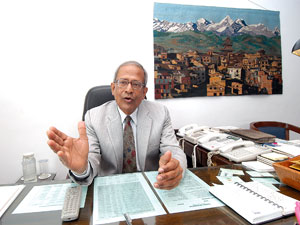Kantipur: The dissolution of the Constituent Assembly without a new constitution marks the end of the road Nepal took after the 12-point agreement signed in New Delhi in November 2006. Do you see that as a failure of New Delhi's role in crafting that agreement? 
Shiv Shanker Mukherjee: India never interfered in the talks between the political parties and the Maoists. That was their business. We provided the security and the locale for the talks, we had no role in the content of the talks. I am not associated with the government of India anymore, but I have seen that the policy remains the same. It was the Nepali people who brought about the changes with the 19-day democracy movement. Nepalis turned their absolute monarchy into a secular, democratic republic. Even rich countries take decades to achieve such change.
Still, isn't the dissolution of the CA a failure of Indian policy towards Nepal?
In a way, Kathmadu has become a hotbed of conspiracy theories. The historic transformation in Nepal is the work of Nepalis themselves, we supported democracy and were ready to help the political parties. But this was mostly logistical support. Frankly, there are no major foreign policy problems with Nepal. I have said elsewhere that a prosperous Nepal is in India's interest. Whatever is good for Nepal is good for India.
Nepal's politics has been complicated by the CA dissolution. What is your assessment?
There are two things to keep in mind. Firstly, although there is some disappointment that the constitution wasn't written, the political parties were able to make a lot of progress in a short period of time. There are only a handful of countries that have made such dramatic progress as Nepal has. The constitution was nearly 90 per cent complete. There is no need for everything to happen at once. Secondly, it may be more appropriate now to have elections for a new parliament instead of a new constituent assembly. Another CA election is like extending the CA again and again. When a new parliament is elected, it can also play the needed role of a constituent assembly.
There is also a proposal to revive the CA?
I don't think it is a good idea. It may be better to elect a new parliament. But the political parties know what needs to be done. Just look at India. Here parliament is the guardian of the constitution, and 60 years after independence there are still demands for new states like in Telengana. But we have a parliament to look at these demands, and there is a commission and the courts look at the legal aspects. This is how democracies and nations progress, not everything has to happen at once.
What are your views on the federalism debate in Nepal?
This is a very sensitive topic, it wouldn't be appropriate for me to comment. Even in rich countries, the issues of race and identity are serious issues, so it's not just in poor countries that we have this debate. And the only solution is democracy. Democracy provides the cushion and offers legal remedies. Nepal is a country with institutions of open society, and remaining under that umbrella, solutions can be found. It is understandable that exploited classes, Madhesis and Janajatis want their rights.
How do you see the role of the international community in Nepal?
It ranges from not helpful to stupid. Some have foolishly tried to extend their political influence through aid.
Like which country?
The western embassies, and especially the Nordics. They don't understand the ground reality in Nepal, and although it may not look like interference, I have noticed they work with the intention of influencing policy. India also has aid projects, similar to the ones it has in Afghanistan, and they are implemented with 100 per cent coordination of the Nepal government and with its agreement.
And China's role?
China is a big economic power. Chinese businesses and contractors are all over the place. So it is normal for them to be in Nepal as well. We don't think China is using Nepal to undermine India's security. Nepal can use the huge markets in India and China for its own development.


